
In a near future dystopia, we live in a panopticon: we’re all under universal surveillance, and computers constantly weigh up everything we say and do. If the algorithms determine that we are likely to commit a crime, we are institutionalised for an unspecified length of time until we are deemed fit to rejoin society. This is the situation of Sara, our protagonist.
It’s a classic Kafkaesque nightmare. (According to the cover, even Jennifer Egan agrees with me.) Sara’s term keeps being extended as she keeps breaking the arbitrary and ever-changing rules of the institution, and nobody can really tell her what she needs to do to escape. The book lays bare the moral bankruptcy of the for-profit prison system: the “Dream Hotel” is of course a prison, despite the staff’s mealy-mouthed denials.
This would all be a good story, and at least somewhat plausible. But the story is cluttered by an unnecessary plot device. Sara has an implant which regulates her sleep; these implants are very popular and immensely beneficial. But part of the small print is that the implant records the user’s dreams, and the recordings can be accessed by authorities as part of the evaluation process. This causes Sara a bit of trouble. But I think that angle is very unrealistic!
First of all, recording people’s dreams seems like mind-reading – magic – complete science fiction. Nothing wrong with science fiction, but it just seems superfluous in this novel. Second, even if it were possible to record dreams, would we really get anything useful from that? Sigmund Freud thought so, but haven’t his ideas been largely discredited? Personally, I am fairly mild-mannered, but some of my dreams are pretty wild. I don’t think anyone, least of all The Authorities, could glean any useful information from them. The inscrutable algorithms already do an effectively sinister job without adding gee-whiz dream-mind-reading technology.
Actually, I think Lalami has overplayed the authorities’ strength. They are so intrusive and have so much power that it’s hard to see how life could be tolerable under that regime. It’s such a social upheaval that it doesn’t seem at all plausible to me that it could happen by stealth. I know it’s happened at all times and places for people to be arbitrarily detained indefinitely for no good reason, but in the Dream Hotel world this is largely seen as legitimate and normal. I think it would take a long time for such a thing to be accepted, but in this book it seems to have been kicked off by a single mass shooting at a sports stadium, as if mass shootings weren’t almost an everyday occurrence in the USA already.
Aside from that, I thought there were a number of potentially interesting plot elements that didn’t really go anywhere. Sara has an antagonist, the head “prison warder”. They clash, he has the upper hand, then she gets the upper hand, and then finally… nothing much happens! They part on good terms with a sort of mutual grudging admiration. The whole story feels like it could be tightened up – some things could be expanded, some (like the dreams) could be removed.
Even so, I enjoyed reading the book. Sara comes away from her experience with a vague resolution that she has to somehow destroy this whole system. Perhaps Lalami has a sequel in the works. I’d definitely read that.